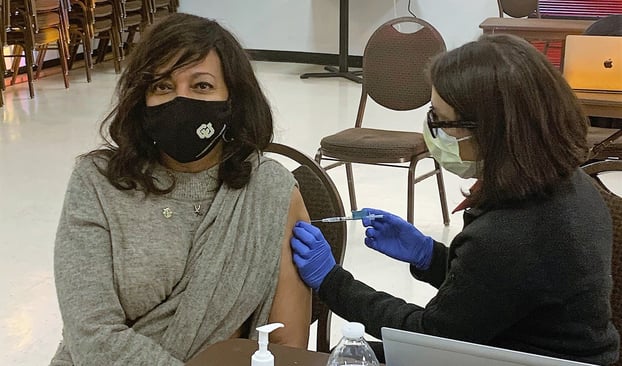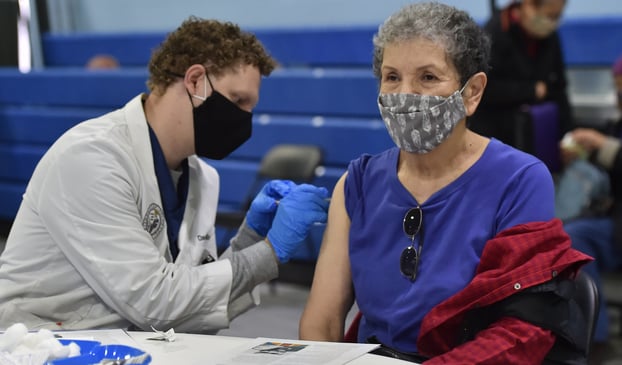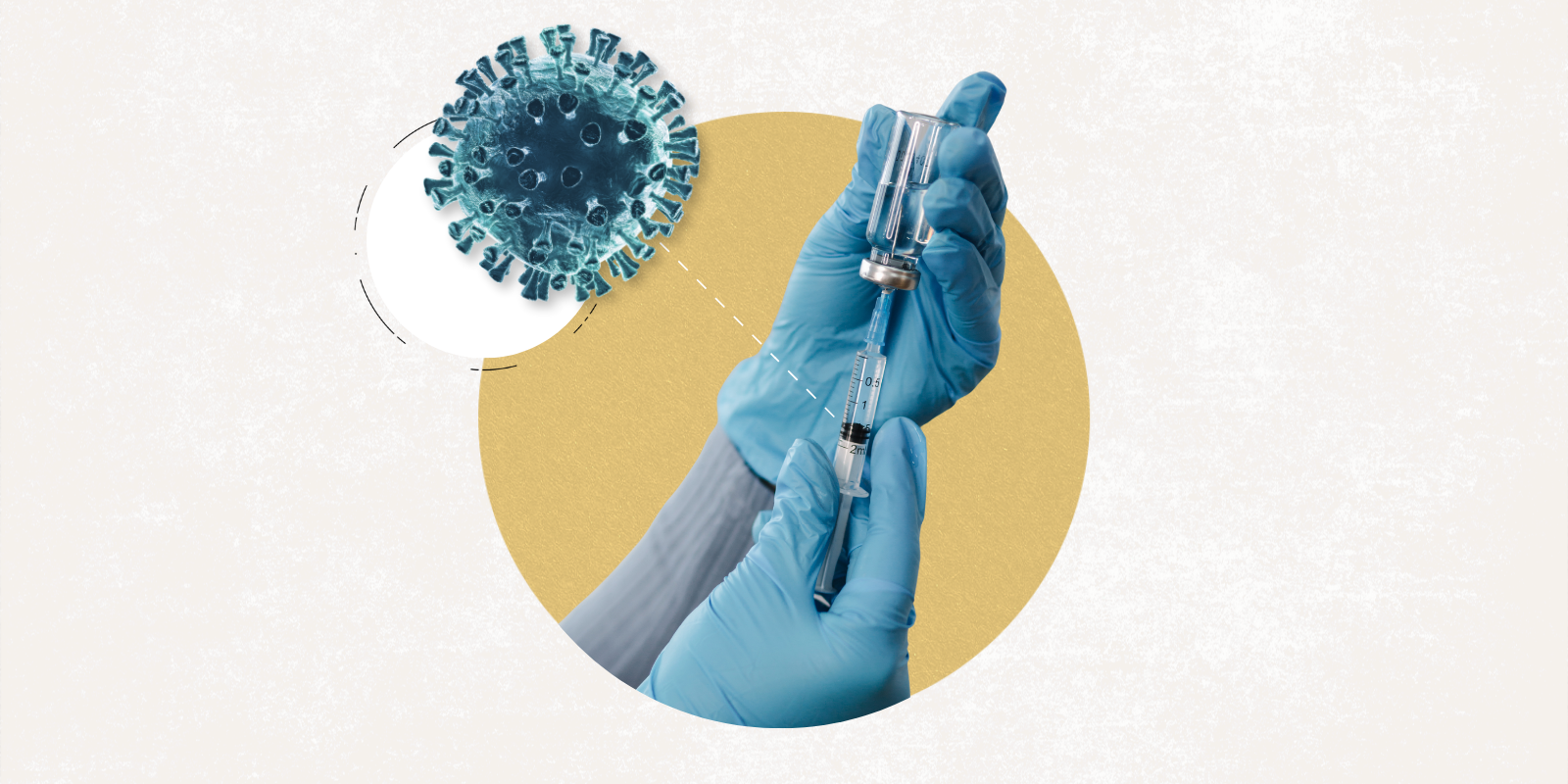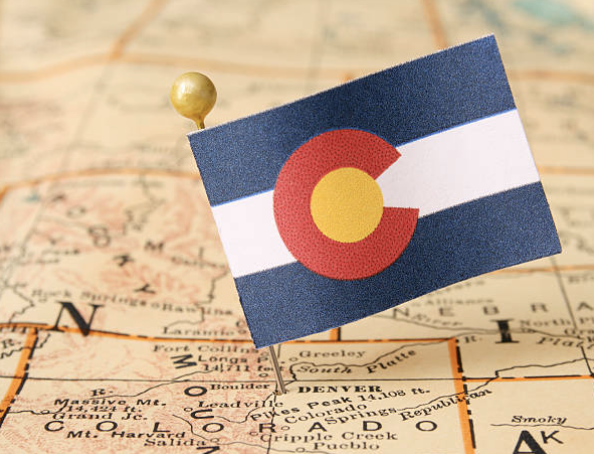Black, Hispanic/Latinx and American Indian/Alaska Native people are more than two-and-a-half times as likely to die from COVID-19 than white people. Despite the unequal burden, early data suggest fewer people from some diverse communities are receiving the vaccine during the rollout.
On Jan. 14, a virtual “COVID-19 Vaccine Community Town Hall: Real Talk for Black and Brown Communities” gathered leaders from the often-under-represented communities to discuss reasons behind vaccine hesitancy and ways the healthcare profession can help address it.
“Our goal is not to repeat the narrative from the media, but to hear from real people in the community,” said Regina Richards, PhD, MSW, associate vice chancellor of Diversity, Equity, Inclusion and Community Engagement at the University of Colorado Anschutz Medical Campus.
Regina Richards, associate vice chancellor of Diversity, Equity, Inclusion
and Community Engagement, gets her COVID-19 vaccine.
The Office of Diversity, Equity, Inclusion and Community Engagement hosted the event, which attracted about 400 viewers. It was moderated by Cerise Hunt, PhD, MSW, associate dean for Diversity, Equity and Inclusion and director for the Colorado School of Public Health (ColoradoSPH) Center for Public Health Practice.
Distrust born of tragedy
“Tuskegee, Tuskegee, Tuskegee,” said Terri Richardson, MD, vice chair of the Colorado Black Health Collaborative, describing what she repeatedly hears from patients when they discuss their fears over the COVID-19 vaccine.
“We want to believe these are different times, but Tuskegee is what happened to Black people in America from 1932 to 1972,” Richardson said of the federal syphilis study that withheld treatment for unknowing Black participants. “You don’t just forget 40 years of not being treated for syphilis. How do we know that things have changed?”
Rhonda Coleman, DAOM, an Aurora acupuncturist, said Tuskegee was not an isolated instance of medical malpractice. “It’s hard for me to believe a system of poor treatment and racism has changed, because that would make medicine the only place in this country where we’ve started to care about Black people,” said Coleman, who reported she did not plan on getting the COVID-19 vaccine.
Similar atrocities among American Indian communities have instilled a distrust of the government as well, said Jerreed Ivanich, PhD, assistant professor at the Centers for American Indian and Alaska Native Health.
“As recently as the 1970s, there was a vast movement to sterilize American Indian women without their consent or knowledge,” Ivanich said. “We don’t know if this new vaccine was made for, and verified by, people who are trusted by Native communities.”
CU pharmacy student David Burch joined fellow students and faculty
recently in providing COVID-19 vaccinations at the Denver Indian Center.
Despite being the hardest hit population in Colorado, his Hispanic/Latinx patients express skepticism about the vaccine in the COVID-19 intensive care wards, said Fernando Holguin, MD, professor of medicine in Pulmonary Sciences and Critical Care and director of the Latino Research & Policy Center.
“They get caught up in the media messaging around the rapidity of vaccine development. They feel there’s not enough experience with the vaccine.” Holguin’s patients, particularly those who are undocumented, are also fearful in the current political environment over potential requirements for receiving a vaccine.
(The Colorado Department of Public Health does not require proof of U.S. residency or lawful presence to receive a vaccine and does not share personal information with immigration or law enforcement.)
Regardless of their fears, many people in the Black, Indigenous and People of Color (BIPOC) communities feel they have little choice about getting the vaccine because of the higher death rates, said Kahlea Kahbir, a racial equity consultant with HerHealthHerVoice and the Colorado Black Health Collaborative.
It comes down to vaccine or ventilator, Kahbir said. “If we don’t want to get the vaccine, what’s the alternative? We don’t want to use fear tactics, but we have lost loved ones, our doctors.”
‘You provide; they decide’
Healthcare professionals need to educate communities about the vaccine, Richardson said. “People need to know how it works, so they can make a decision. You provide; they decide.”
Richardson hailed the key roles Black scientists and pharmaceutical representatives played in the vaccine development and celebrated the 10% of clinical trial participants who were Black.
“Who had our back in the development and distribution of this vaccine?” she said of the experts represented on a video by BlackDoctor.org that kicked off the town hall.
Offering some of that education, Holguin said the available Pfizer-BioNTech and Moderna COVID-19 vaccines appear to be equally effective, but that both doses need to come from the same company. The vaccines are based on messenger RNA (mRNA) technology, which gives instructions for making a protein.
“RNA cannot be incorporated into your genes,” Holguin said, responding to commonly publicized concerns. “It doesn’t stay in your body, and it can’t give you COVID-19.”
Healthcare and government professionals have an opportunity to prove to marginalized communities that they are important during this historical vaccine distribution, said Stephanie Nwagwu, a student in the CU School of Medicine and Colorado SPH.
More than 400,000 people have died from COVID-19 in the United States. If one second of silence were held for every life lost, the silence would last for four-and-a-half days.
“We need to think about vaccines being distributed equitably to those who need it the most: the people with the highest infection and death rates.”
Cultural factors, such as the abundance of mixed-age homes among Latinx communities, are also important considerations in vaccine distribution, said Vicky Lee-Garza, a graduate student in the ColoradoSPH and the School of Social Work. “If older family members receive the vaccine, should whole families get vaccinated at the same time to maximize protection?”
Some attendees brought up concerns over reports of serious side effects from the vaccine. “Any vaccine can cause allergic reactions,” Holguin said. “The numbers are very small in comparison to the total number who have been vaccinated.”
Still, Richardson said to the side effect questions: “Time will tell. Not enough time has passed to answer all of these questions.”
Finding a path forward
Moving forward, Richardson said leaders need to slow down, listen and build relationships in their communities. Kahbir added, “There are no shortcuts to building rapport with people. We trust the people we see, because we know their hearts and their intentions.”
Nearly all panelists emphasized the need for careful messaging. “We need a way to tell our Hispanic/Latinx communities that thousands of people have already been vaccinated, and it’s safe and effective,” Holguin said. “But we need trusted messengers.”
“As recently as the 1970s, there was a vast movement to sterilize American Indian women without their consent or knowledge.” – Jerreed Ivanich, PhD
Ivanich praised the positive messaging he’s seen surrounding vaccination within Native communities. “Our elders are our most sacred resource, so messaging focused on protecting them and maintaining their knowledge as language keepers is effective,” he said. “It’s not about you individually; it’s about protecting everyone in your community.”
As part of both the medical community and the Black community, Nwagwu acknowledged the pain of the past but said she believes the medical system is trying to change. “Trust, reconciliation on behalf of the medical community, uptake of the vaccine: This is how we move forward from COVID-19.”



.png)

